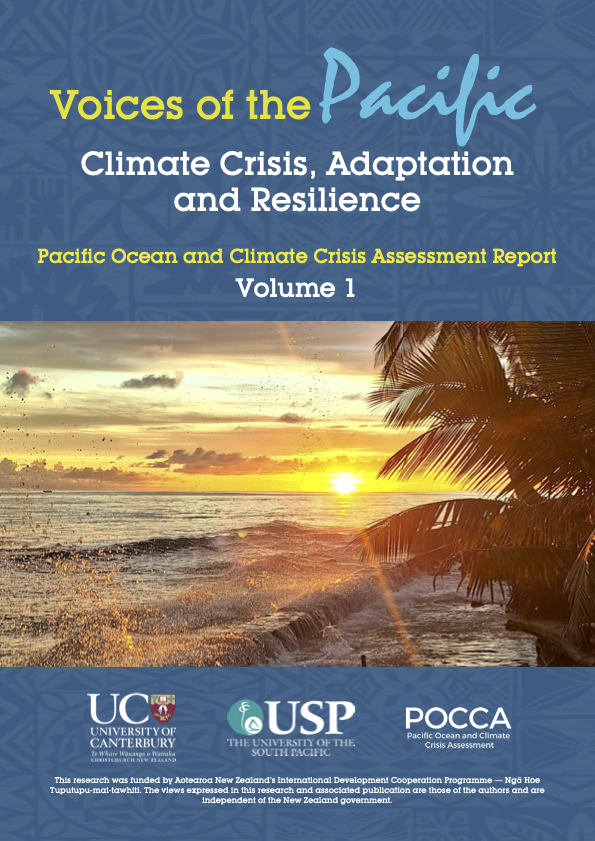(POCCA)
The POCCA project provides an interdisciplinary, multicultural, and transnational study of the impacts of climate change and community responses covering 16 Pacific Island Countries and Territories (PICTs): Cook Islands, Federated States of Micronesia, Fiji, Kiribati, Nauru, Niue, Palau, Papua New Guinea, Republic of the Marshall Islands, Samoa, Solomon Islands, Timor-Leste, Tokelau, Tonga, Tuvalu, and Vanuatu.

Click here for Get Full Report
Global Launch
The POCCA Report was launched on 11 November 2024 at the United Nations Climate Change Conference, COP29, at Baku, Azerbaijan, by the Director-General of the Secretariat of the Pacific Regional Environment Programme (SPREP), Mr Sefanaia Nawadra.
POCCA brought together the largest number of Pacific scholars ever to work together collaboratively on a single project. The project helped to transform and enrich the Pacific research culture, regional networking and collaboration in significant ways. Those involved were from all universities in New Zealand (University of Canterbury, University of Otago, Lincoln University, Victoria University of Wellington, Massey University, University of Waikato, University of Auckland and Auckland University of Technology) as well as crown research entities such as the National Institute of Water and Atmospheric Research Ltd (NIWA) and Institute of Geological and Nuclear Sciences (GNS); universities from the Pacific region (University of the South Pacific, National University of Samoa, Fiji National University, Solomon Island National University, University of Papua New Guinea, and University of Hawaii); as well as scholars from Australian universities (University of Melbourne, University of Queensland, Griffith University, and University of Tasmania).
The disciplines represented include meteorology, oceanography, biology, physics, geography, environmental studies, geology, hydrology, engineering, medicine, public health, nursing, sociology, social anthropology, social work, history, economics, accounting, development studies, political science, education, fisheries, agriculture, sustainability, international relations, media studies, cultural studies, Indigenous studies, theology, psychology, law, policy, management, and governance. This diversity of intellectual, applied, and methodological approaches shows the multidimensional, interdisciplinary nature of climate change. Climate change affects every aspect of Earth’s physical environment as well as every facet of social, cultural, economic, technological, political, infrastructural, psychological, and spiritual life. The report covers all these aspects by weaving together technical assessments as well as Pacific community narratives and Indigenous knowledge.
More information about the POCCA Project
The project was led by Director of UC’s Macmillan Brown Centre for Pacific Studies, Distinguished Professor and Pro-Vice-Chancellor Pasifika, Steven Ratuva with the collaboration of over 100 researchers from 16 countries, as well as numerous community members. The objective was to address the pressing climate crisis in the Pacific region and develop climate-proofing policies for the future. By focusing on resilience, adaptation, and sustainability, the project aimed to understand local responses to the climate crisis. This three-year project now represents the most extensive climate research effort in the Pacific and has created a significant international research community. It has also helped constituted the largest database of climate impacts and responses in the region.
Led by Te Whare Wānanga o Waitaha | University of Canterbury (UC) and the University of the South Pacific (USP), the project was financed by a grant from New Zealand’s Ministry of Foreign Affairs and Trade.
Media Archive
07 May 2024
More than sixty Pacific experts from the Pacific region will attend a conference to reflect on the nexus between Indigenous knowledge and the climate crisis in the Pacific region. The conference is organised by the University of Canterbury (UC) and the University of the South Pacific (USP) with support from the New Zealand Ministry of Foreign Affairs and Trade (MFAT) using the theme, “Re-imagining climate crisis resilience and Indigenous knowledge”. The conference is part of the Pacific Ocean and Climate Crisis Assessment (POCCA) project and will be held on 8-10 May 2024 at the University of Canterbury, Ōtautahi Christchurch, Aotearoa New Zealand.
15 November 2023
New interdisciplinary Pacific Studies courses developed at the University of Canterbury (UC) draw on cutting-edge research from the region. Three new undergraduate courses – The Global Pacific; The Contemporary and Transnational Pacific; and Pacific Sustainability and Climate Resilience – reframe current deficit narratives of the Pacific and its communities, celebrating a long history of resilience, Indigenous knowledge and innovation. UC researchers who developed the courses are involved in the pioneering Pacific Ocean and Climate Crisis Assessment (POCCA) study, which studies climate mitigation and adaptation in 16 countries in the Pacific region, with a focus on giving voice to Indigenous knowledge.
